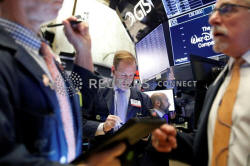Banks and funds lower red flags on supercharged stocks
 Send a link to a friend
Send a link to a friend
 [November 18, 2019] By
Tom Westbrook and Tom Arnold [November 18, 2019] By
Tom Westbrook and Tom Arnold
SINGAPORE/
LONDON (Reuters) - A raft of
major banks and fund managers have upgraded their view on global
equities, with emerging-market stocks their top pick to benefit from
signs of easing in the Sino-U.S. trade dispute.
Fund manager J.P. Morgan Asset Management raised its outlook on global
stocks, pointing to hopes for a breakthrough in the U.S.-China trade
discussions, a reduced risk of a U.S. recession and a moderately
positive earnings outlook.
The call, from the manager of $1.8 trillion in assets, comes as U.S.
stock markets sit at a record high but a recent bond rally shows signs
of unwinding.
"We have held a cautious view on the outlook for equity markets for much
of this year ... however, the environment has shifted in recent weeks"
Patrik Schowitz, global multi-asset strategist at the fund manager, said
in an emailed note.
"That change likely reflects several factors, which we think has some
more room to run," he said.

Schowitz cited renewed optimism that Beijing and Washington will reach
an agreement to end their trade dispute, recession risk in the U.S.
dropping from an even chance to 20% to 30% and the possibility of
earnings growth as the main factors. He did not specify how the upgrade
would affect asset allocation nor offer target levels for equity
indices.
Emerging-market equities were the most favored pick, alongside U.S.
large-cap equities, Schowitz said.
Meanwhile, UBS said it was closing its underweight to emerging-market
stocks and moved its overall position on equities to neutral.
"There have been material signs a U.S.-China deal is more likely, while
monetary policy and economic fundamentals are also now more supportive,"
said Mark Haefele, chief investment officer at UBS Global Wealth
Management. "While equity prices have risen and downside risks remain,
upside potential has also increased."
[to top of second column] |

Traders work on the floor at the New York Stock Exchange (NYSE) in
New York, U.S., November 13, 2019. REUTERS/Brendan McDermid

Morgan Stanley also joined in, upgrading emerging-market equities to equal
weight from underweight on a better global growth outlook outside the U.S.,
singling out South Korea which it upped to overweight.
Morgan Stanley saw the biggest potential in markets with a clearer path to
earnings growth, such as developing-market stocks and Japan, or a scope for
multiple re-rating on falling political risks, such as Europe.
"Neither of these factors are at play in the U.S., where we remain UW
(underweight) given peak earnings risk, higher relative valuation and unique
political risk to sentiment," it added.
Rabobank also spotted signs of change, saying November's divergence between the
MSCI emerging-markets stocks index and the S&P 500 Index against the MSCI
Emerging Market Currency Index, which during September and October rose in
tandem, was unlikely to last.
"Either EM stocks will start to outperform U.S. equities and the ratio rises
sharply or the MSCI EM FX Index falls," it said.
World shares were close to a record high on Monday after Beijing surprised
markets by trimming a key interest rate for the first time since 2015, stirring
speculation that further stimulus was on the way for the world's second-largest
economy.

(Reporting by Tom Westbrook in Singapore and Tom Arnold and Karin Strohecker in
London; graphic by Karin Strohecker; editing by Shailesh Kuber, Larry King)
[© 2019 Thomson Reuters. All rights
reserved.] Copyright 2019 Reuters. All rights reserved. This material may not be published,
broadcast, rewritten or redistributed.
Thompson Reuters is solely responsible for this content. |